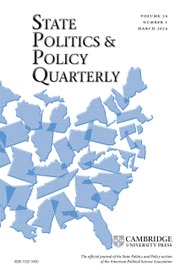Crossref Citations
This article has been cited by the following publications. This list is generated based on data provided by
Crossref.
Maestas, Cherie
Neeley, Grant W.
and
Richardson, Lilliard E.
2003.
The State of Surveying Legislators: Dilemmas and Suggestions.
State Politics & Policy Quarterly,
Vol. 3,
Issue. 1,
p.
90.
Clarke, Susan
2006.
Handbook of Public Policy Analysis.
Vol. 20061243,
Issue. ,
p.
443.
Hoston, William T.
2012.
Black legislative politics: Examining the issue of voting rights in the post-Hurricane Katrina period.
The Social Science Journal,
Vol. 49,
Issue. 4,
p.
476.
Marland, Alex
and
Giasson, Thierry
2013.
Investigating political marketing using mixed method: the case for campaign spending data.
Journal of Public Affairs,
Vol. 13,
Issue. 4,
p.
391.
Honan, Eileen
Hamid, M. Obaidul
Alhamdan, Bandar
Phommalangsy, Phouvanh
and
Lingard, Bob
2013.
Ethical issues in cross-cultural research.
International Journal of Research & Method in Education,
Vol. 36,
Issue. 4,
p.
386.
Chaban, Natalia
Elgström, Ole
Kelly, Serena
and
Yi, Lai Suet
2013.
Images of the EU beyond its Borders: Issue‐Specific and Regional Perceptions of European Union Power and Leadership.
JCMS: Journal of Common Market Studies,
Vol. 51,
Issue. 3,
p.
433.
Bloxham, Ray
Ehrich, Lisa C.
and
Iyer, Radha
2015.
Leading or managing? Assistant Regional Directors, School Performance, in Queensland.
Journal of Educational Administration,
Vol. 53,
Issue. 3,
p.
354.
Gorbacheva, Natalya V.
and
Sovacool, Benjamin K.
2015.
Pain without gain? Reviewing the risks and rewards of investing in Russian coal-fired electricity.
Applied Energy,
Vol. 154,
Issue. ,
p.
970.
Newell, Robert
and
Dale, Ann
2015.
Meeting the Climate Change Challenge (MC3): The Role of the Internet in Climate Change Research Dissemination and Knowledge Mobilization.
Environmental Communication,
Vol. 9,
Issue. 2,
p.
208.
Gillard, Ross
2016.
Unravelling the United Kingdom’s climate policy consensus: The power of ideas, discourse and institutions.
Global Environmental Change,
Vol. 40,
Issue. ,
p.
26.
Moldavanova, Alisa
2016.
Two Narratives of Intergenerational Sustainability.
The American Review of Public Administration,
Vol. 46,
Issue. 5,
p.
526.
Cabanda, Exequiel
2017.
Higher Education, Migration and Policy Design of the Philippine Nursing Act of 2002.
Higher Education Policy,
Vol. 30,
Issue. 4,
p.
555.
Leiser, Stephanie
2017.
The Diffusion of State Film Incentives: A Mixed-Methods Case Study.
Economic Development Quarterly,
Vol. 31,
Issue. 3,
p.
255.
Gillard, Ross
and
Lock, Kathryn
2017.
Blowing policy bubbles: rethinking emissions targets and low-carbon energy policies in the U.K..
Journal of Environmental Policy & Planning,
Vol. 19,
Issue. 6,
p.
638.
Vaha, Milla Emilia
2018.
Hosting the Small Island Developing States: two scenarios.
International Journal of Climate Change Strategies and Management,
Vol. 10,
Issue. 2,
p.
229.
Noel, Lance
Zarazua de Rubens, Gerardo
Kester, Johannes
and
Sovacool, Benjamin K.
2018.
Beyond emissions and economics: Rethinking the co-benefits of electric vehicles (EVs) and vehicle-to-grid (V2G).
Transport Policy,
Vol. 71,
Issue. ,
p.
130.
Piotrowska, Barbara
2018.
The Price of Collaboration: How Authoritarian States Retain Control.
SSRN Electronic Journal,
Porte, Teresa La
and
Pavón-Guinea, Andrea
2018.
Considering cities’ role in a European Union multi-level governance context: an assessment of officials’ attitudes.
European Politics and Society,
Vol. 19,
Issue. 1,
p.
49.
Casarez Lemi, Danielle
2018.
Identity and coalitions in a multiracial era: how state legislators navigate race and ethnicity.
Politics, Groups, and Identities,
Vol. 6,
Issue. 4,
p.
725.
Mahieu, Rilke
2019.
Competing Origin-country Perspectives on Emigrant Descendants: Moroccan Diaspora Institutions’ Policy Views and Practices Regarding the “Next Generation Abroad”.
International Migration Review,
Vol. 53,
Issue. 1,
p.
183.


